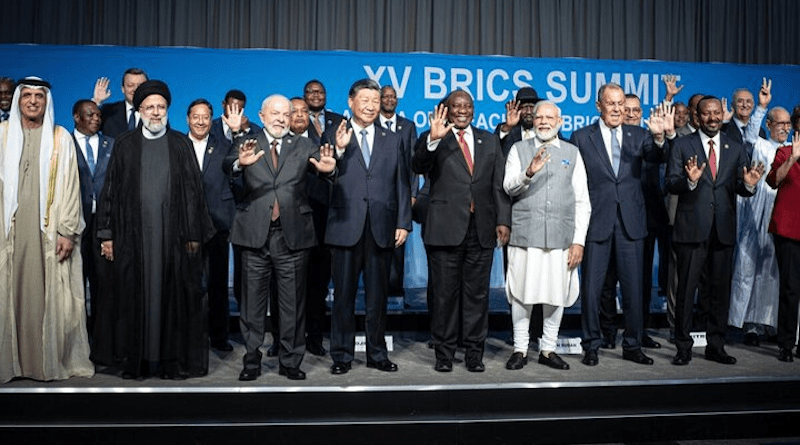BRICS – International: The Beginning Of A Non-Hierarchical Global Order – OpEd
By Greg Pence
The G7 summit convened in Japan, bringing together leaders from Canada, the European Union, France, Germany, Italy, Japan, and the United Kingdom. Meanwhile, BRICS members held consultations in South Africa on issues of common and global interest. A glance at the geopolitical and geostrategic composition and reach of the BRICS countries, comprising Brazil, Russia, India, China, and South Africa, reveals an increase in geopolitical power and influence in this group, which has the potential to challenge the financial system and security mechanisms led by the West. The main factor in strengthening the solidarity among BRICS members is the perception that the United States has become inconsistent and unreliable in its foreign policy.
This distrust stems from the United States’ persistent abuse of international pressure mechanisms. The US has employed these mechanisms to sanction and punish countries with which it has disputes, and now it is using the Group of Seven (G7) as an instrument of economic pressure to support and justify its actions in other regions. Countries are accepted as US allies only if they become the instruments of its economic or military wars against other countries.
Another issue is that the US and its allies benefit from “rule-based order” at the expense of others. Many leaders, especially in China and Russia, doubt America’s leadership role. Africa’s envoy to BRICS, Anil Sooklal, told Newsweek that over 20 countries want to join BRICS, which aims to create an inclusive and competitive global mechanism.
BRICS-style globalization
BRICS challenges the dominant paradigm of globalization that is driven by American interests and standards. This type of globalization erodes the identity and values of other countries and forces them to conform to the American model and its liberal agenda. This is evident in the US’s willingness to accept the Taliban as a legitimate and democratic representative of the Afghan people when it suits its interests.
In contrast, BRICS envisions a new phase of globalization that is based on the formation of diverse alliances that respect the differences and interests of all parties. Instead of imposing one’s values and exploiting one’s resources, as the US did in its globalizing project, BRICS aims to create an order that fosters the well-being and cooperation of all members. This order would focus on areas such as post-pandemic economic recovery, technological innovation, sustainable development, and human exchange. These areas would replace the rigid logic of competition that characterizes the current situation.
The beginning of the end of the dollar’s dominance
One of the crucial steps to liberate the world economy from the US influence is to reduce the reliance on the dollar as the medium of exchange. The new phase of globalization recognizes and embraces a multipolar world that needs to prevent the recurrence of the errors of dollar supremacy and sanctions. These have been used by the US as instruments of coercion and punishment, rather than as sources of global economic integration. In this context, BRICS aims to create balanced and inclusive economic growth that can benefit all countries. This can be facilitated by establishing a development bank within BRICS, similar to China’s Asian Development Bank.
A development bank can provide more and better development finance options for the countries of the global south. These options can be used for building and improving infrastructure, instead of importing and consuming goods and promoting consumerism. The infrastructure improvement can increase multilateral trade exchanges between BRICS members and the independent countries of the global south.
The enlargement of BRICS as a horizontal power block that opposes the US-led G7 is a remarkable development. Several countries such as Iran, Saudi Arabia, Belarus, and Turkey have indicated their interest in joining BRICS to deal with their difficulties with the US and its order. These countries view BRICS mechanisms as a solution to some of their issues with the US and its order that stems from the American mindset. For countries that are under sanctions such as Iran, Russia, and Belarus, as well as countries that are engaged in economic war with the West, such as China, due to the complex relationship they have with the West, the existence of a development bank can be a potential source to bolster the solidarity of the global south and to break the vicious cycle of sanctions that hampers their development.
The reduction of the dollar’s role in China-Russia relations can be a model for the collapse of the US coercive order. China and Russia have boosted their trade and currency exchanges considerably in the past year. For example, 40% of Russia’s imports came from China and 30% of its exports went to China. While the Russian people were not familiar with the Chinese yuan before, today 15% of the Russian Central Bank’s foreign exchange reserves are in yuan, and 33% of the demand among Russians to buy yuan has emerged. As a result, along with the de-dollarization of the Russian economy, a kind of economic dependence of Russia on China is also occurring. This may please China, which does not want to take a clear stance on Ukraine, as it makes Russia, a global military power that shares its border with China, more economically reliant on Beijing.
In the aftermath of the economic crisis, a new belief is emerging that challenges the Americans: what you marketed to us as our own interests was actually your maximum interests. Now is the time to seek our own interests. Therefore, generally, the creation of fair and developmental financial mechanisms, a horizontal power system rather than a hierarchical power system, and pluralistic arrangements while preserving unity in advancement and common peace can be a macro model for new international relations under the banner of BRICS-International

